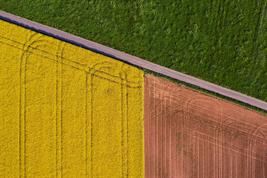15.07.2025

A research team with the involvement of the Leibniz Centre for Agricultural Landscape Research (ZALF) has investigated how the transition to a so-called bioeconomy — an economic system based on renewable instead of fossil resources — can be made fair and sustainable. Their perspective article was published in the journal Energy Research & Social Science. The article was developed as part of the Leibniz Network Working Group "Bioeconomy" of the Section "Earth and Society." The authors examine the ecological, economic, and social challenges and propose ways to better address trade-offs between climate protection, biodiversity, and social justice.
The bioeconomy aims to replace fossil resources such as crude oil with renewable biological materials like wood or crops – for energy, building materials or bioplastics. This is intended to reduce climate-damaging emissions. But the growing demand for biomass brings new challenges: renewable resources require land, which in many countries results in deforestation or the loss of natural habitats. The Global South is particularly affected, where large areas are often used for cultivating energy crops – with negative consequences for food security and local communities.
It’s not enough to focus on climate alone
"The shift to a bioeconomy must not come at the expense of people in the Global South or biodiversity", said Dr. Maren Dubbert, one of the co-authors from ZALF. "Only by considering environmental impacts, biodiversity, and social justice together can we achieve a fair transformation."
„We are particularly critical of current EU strategies, as they often prioritize economic interests while overlooking social concerns and environmental impacts“, says Dr. Anette Ruml from the German Institute for Global and Area Studies (GIGA), lead author of the study. „For instance, large volumes of palm oil are imported for biodiesel production from countries like Indonesia – even though this frequently leads to deforestation and undermines local livelihoods.“
A systemic transition requires broad participation and better coordination
The study emphasizes that a fair bioeconomy requires the participation of all relevant stakeholders, including policymakers, industry representatives, civil society organizations, researchers, and local communities. The authors advocate for participatory processes and global cooperation to develop sustainable supply chains, ensure equitable access to land and technology, and establish common rules with minimal bureaucratic hurdles.
At the same time, the authors criticize the lack of coordination between EU policy areas. Measures in forestry, agriculture, energy, and industry are often poorly aligned. Even new EU regulations, such as due diligence rules for deforestation-free products, are considered insufficient — as they typically apply only to large companies and fail to address other environmental risks, such as soil degradation and water scarcity.
Outlook: The bioeconomy as a driver of transformation — when approached from a holistic perspective.
The authors suggest incorporating the bioeconomy into a broader research framework that encompasses ecological and social systems. This is the only way to sufficiently understand and assess the complex interactions and global dependencies of the bioeconomy. Key questions include: Who benefits from the bioeconomy? What risks arise for people and the environment? How can different interests be balanced fairly?
A just transition requires clear scientific reference points, such as the concept of planetary boundaries, as well as open dialogue formats involving all stakeholders. With these measures in place, the bioeconomy could become a driver of a sustainable future that is socially just, environmentally sound, and economically viable — all within the limits of our planet.
Project partner:
Further Information:
Link to the publication:
https://www.sciencedirect.com/science/article/pii/S2214629625001707#f0010
Text disclaimer:
This is a summary of the original text created with the help of artificial intelligence:
Ruml, A., Chen, C., Kubitza, C., et al. (2025). Minimizing trade-offs and maximizing synergies for a just bioeconomy transition, Energy Research & Social Science, 125, 104089. https://doi.org/10.1016/j.erss.2025.104089, published Open Access under the license CC BY 4.0: https://creativecommons.org/licenses/by/4.0/.
The text has been carefully reviewed and revised in accordance with ZALF’s AI use guidelines.
